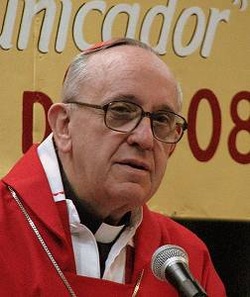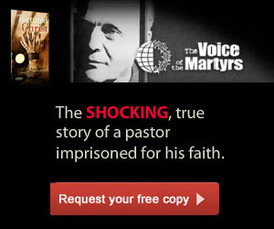
Cardinal Jorge Mario Bergoglio, the archbishop of Buenos Aires, was elected as pope Wednesday (March 13), choosing Pope Francis as his name and becoming the first non-European pope in the modern era. Latin America now is home to about 40 percent of the world's Catholics.
Francis has taken stands with the Argentinian government in support of traditional marriage and the sanctity of life, CNN reported. He succeeds Pope Benedict XVI, who abdicated in February after an eight-year pontificate.
Francis has taken stands with the Argentinian government in support of traditional marriage and the sanctity of life, CNN reported. He succeeds Pope Benedict XVI, who abdicated in February after an eight-year pontificate.
Alan Sears, president of Alliance Defending Freedom -- a Christian legal group -- applauded the election.
"We join millions in congratulating Francis I on his selection as pope," Sears said. "He is a leader who has stood strongly for the values of religious freedom, the sanctity of human life, marriage, and the family, often under very trying circumstances. We appreciate his many strong statements over the years on the protection of marriage and the unborn and trust he will continue to be a powerful voice on the deep importance of these issues."
The Argentine-born Francis is the son of an Italian railway worker and is known as a compassionate conservative, according to NBC News. Reports indicate he was the runner-up during the balloting in 2005 that elected Benedict.
"The 76-year-old Jesuit prizes simplicity and humility and would encourage priests to do shoe-leather evangelization, his biographer says," NBC News reported.
Francis entered the Society of Jesus in 1958 and obtained a licentiate in philosophy, according to the Catholic News Agency. He was ordained a priest in 1969 and became a theology professor. Francis also was a provincial leader for the society and a seminary rector.
The first Jesuit pope, Francis was elected on the first fifth-ballot vote in more than 100 years, on the first full day the College of Cardinals gathered in the conclave at the Sistine Chapel. A two-thirds majority vote was required, meaning 77 of the 115 cardinals were needed to secure a new pope.
Observers said the relatively quick election signaled the new pope would lead as a traditionalist, even as some Catholics hoped he would take more liberal stances on controversial issues.
By choosing the name Francis, the new pope may intend to follow the example of humility, simplicity and care for the poor set by St. Francis of Assisi (1181/2-1226), commentators said.
White smoke was seen rising from the chimney on the Sistine Chapel in Rome at 7:06 p.m. local time Wednesday, accompanied by the ringing of bells at St. Peter's Basilica.
Speaking to the crowd outside the basilica, Francis asked Catholics to pray for him.
Christendom had no pope at the time of Christ's death and resurrection. Nor did the pope's authority ever extend to the various branches of Eastern Orthodoxy in subsequent centuries.
The papacy's development spanned several centuries, with the first dates attached to the papacy, as recounted in the Westminster Dictionary of Church History, revolving around Pope Leo the Great in the fifth century.
"The Petrine doctrine of papal supremacy was clearly stated by Pope Leo the Great (440-461) and defended in the writings of certain church fathers, in particular Augustine (d. 430) and Gregory the Great (d. 604), who himself became pope in 590 and whose firm leadership set the tradition of papal guidance in both dogma and church organization," the Westminster volume states.
By the middle of the 11th century, the election of a pope had become "firmly vested in a college of cardinals," the Westminster volume notes.
However, the papacy often faced turbulent times, such as "the establishment of rival pontiffs in Roman and France" from 1378-1418, according to the Westminster volume, in a rift initially created by a French king and later resolved by a series of church councils.
Today, Catholic doctrine holds that the pope is "the representative (vicar or vicegerent) of Christ on earth, and that his solemn official pronouncements on matters of faith and morals are infallible, safeguarded from error by God," the Westminster volume states.
R. Albert Mohler Jr., president of Southern Baptist Theological Seminary, wrote after Pope John Paul II's death in 2005: "For evangelicals, the crucial question comes with the institution of the papacy itself. After all, the Reformation of the 16th century required a rejection of papal power and authority, and the Reformers soon came to understand the papacy as an unbiblical office that inevitably compromised the authority and sufficiency of Scripture....
"Furthermore, this office is then invested with claims to spiritual and temporal power that are combined with claims of apostolic succession and serve as foundational pillars for the comprehensive claims of the Roman Catholic Church," Mohler wrote, noting, "The Protestant rejection of the papacy was no small matter, though some liberal Protestants and careless evangelicals seem to have forgotten why."
Mohler maintained that evangelicals "simply cannot accept the legitimacy of the papacy and must resist and reject claims of papal authority. To do otherwise would be to compromise biblical truth and reverse the Reformation."
"We join millions in congratulating Francis I on his selection as pope," Sears said. "He is a leader who has stood strongly for the values of religious freedom, the sanctity of human life, marriage, and the family, often under very trying circumstances. We appreciate his many strong statements over the years on the protection of marriage and the unborn and trust he will continue to be a powerful voice on the deep importance of these issues."
The Argentine-born Francis is the son of an Italian railway worker and is known as a compassionate conservative, according to NBC News. Reports indicate he was the runner-up during the balloting in 2005 that elected Benedict.
"The 76-year-old Jesuit prizes simplicity and humility and would encourage priests to do shoe-leather evangelization, his biographer says," NBC News reported.
Francis entered the Society of Jesus in 1958 and obtained a licentiate in philosophy, according to the Catholic News Agency. He was ordained a priest in 1969 and became a theology professor. Francis also was a provincial leader for the society and a seminary rector.
The first Jesuit pope, Francis was elected on the first fifth-ballot vote in more than 100 years, on the first full day the College of Cardinals gathered in the conclave at the Sistine Chapel. A two-thirds majority vote was required, meaning 77 of the 115 cardinals were needed to secure a new pope.
Observers said the relatively quick election signaled the new pope would lead as a traditionalist, even as some Catholics hoped he would take more liberal stances on controversial issues.
By choosing the name Francis, the new pope may intend to follow the example of humility, simplicity and care for the poor set by St. Francis of Assisi (1181/2-1226), commentators said.
White smoke was seen rising from the chimney on the Sistine Chapel in Rome at 7:06 p.m. local time Wednesday, accompanied by the ringing of bells at St. Peter's Basilica.
Speaking to the crowd outside the basilica, Francis asked Catholics to pray for him.
Christendom had no pope at the time of Christ's death and resurrection. Nor did the pope's authority ever extend to the various branches of Eastern Orthodoxy in subsequent centuries.
The papacy's development spanned several centuries, with the first dates attached to the papacy, as recounted in the Westminster Dictionary of Church History, revolving around Pope Leo the Great in the fifth century.
"The Petrine doctrine of papal supremacy was clearly stated by Pope Leo the Great (440-461) and defended in the writings of certain church fathers, in particular Augustine (d. 430) and Gregory the Great (d. 604), who himself became pope in 590 and whose firm leadership set the tradition of papal guidance in both dogma and church organization," the Westminster volume states.
By the middle of the 11th century, the election of a pope had become "firmly vested in a college of cardinals," the Westminster volume notes.
However, the papacy often faced turbulent times, such as "the establishment of rival pontiffs in Roman and France" from 1378-1418, according to the Westminster volume, in a rift initially created by a French king and later resolved by a series of church councils.
Today, Catholic doctrine holds that the pope is "the representative (vicar or vicegerent) of Christ on earth, and that his solemn official pronouncements on matters of faith and morals are infallible, safeguarded from error by God," the Westminster volume states.
R. Albert Mohler Jr., president of Southern Baptist Theological Seminary, wrote after Pope John Paul II's death in 2005: "For evangelicals, the crucial question comes with the institution of the papacy itself. After all, the Reformation of the 16th century required a rejection of papal power and authority, and the Reformers soon came to understand the papacy as an unbiblical office that inevitably compromised the authority and sufficiency of Scripture....
"Furthermore, this office is then invested with claims to spiritual and temporal power that are combined with claims of apostolic succession and serve as foundational pillars for the comprehensive claims of the Roman Catholic Church," Mohler wrote, noting, "The Protestant rejection of the papacy was no small matter, though some liberal Protestants and careless evangelicals seem to have forgotten why."
Mohler maintained that evangelicals "simply cannot accept the legitimacy of the papacy and must resist and reject claims of papal authority. To do otherwise would be to compromise biblical truth and reverse the Reformation."


 RSS Feed
RSS Feed